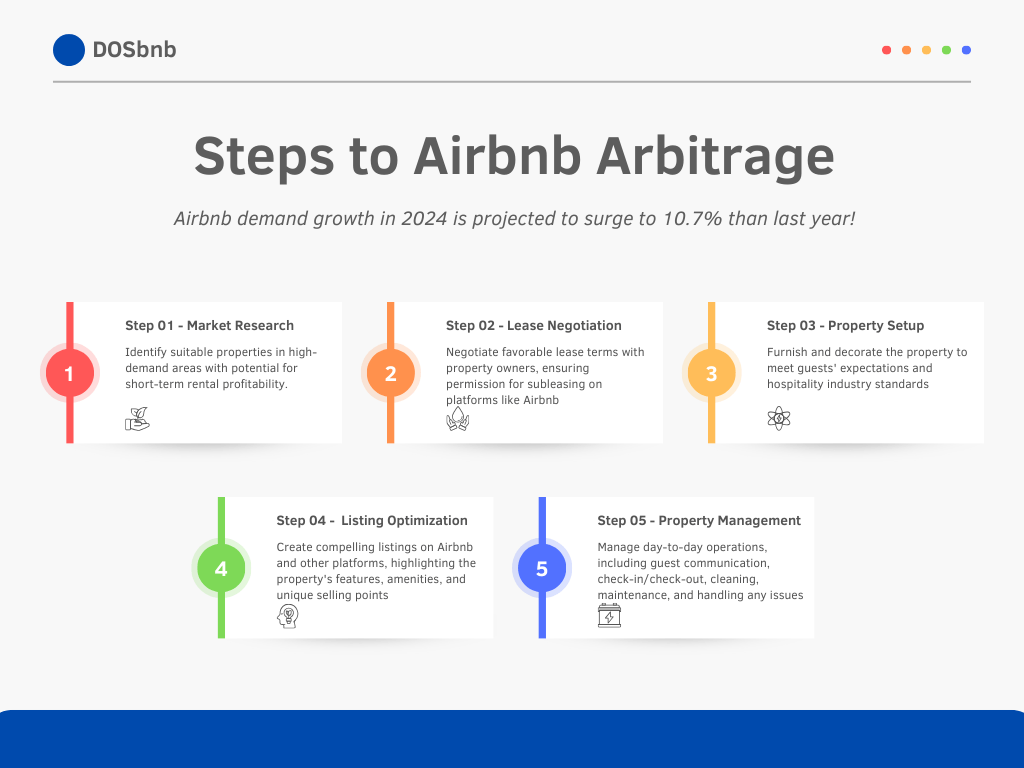What is Airbnb Arbitrage? Is it legal and profitable in 2024?
Airbnb Arbitrage, in essence, involves leasing a property from the homeowner on a yearly basis and then subleasing it on a short-term or mid-term basis through platforms like Airbnb, VRBO and Booking.com, ultimately profiting from the price differential.
While the concept may seem straightforward at first glance, there are numerous considerations and complexities involved in successfully operating an Airbnb Arbitrage business. Firstly, identifying suitable properties that are conducive to short-term rentals and negotiating favorable lease terms with homeowners require careful market research and negotiation skills. Factors such as location, property condition, amenities, and local regulations must be taken into account to ensure the property’s attractiveness to guests and compliance with legal requirements.
Additionally, managing the property effectively as a short-term rental entails a range of responsibilities, including listing optimization, guest communication, check-in/check-out procedures, cleaning and maintenance, and handling any issues or emergencies that may arise during guests’ stays. Providing a seamless and enjoyable experience for guests is crucial for maintaining positive reviews and attracting repeat bookings, which directly impact the property’s occupancy rates and profitability.
Moreover, the financial aspects of Airbnb Arbitrage demand close attention to detail and ongoing analysis. Calculating the potential return on investment (ROI) requires factoring in various expenses such as rent, utilities, cleaning fees, property management fees (if applicable), insurance, taxes, and any other operational costs. It’s essential to accurately estimate rental income based on market demand, seasonality, competition, and occupancy rates to ensure that the business remains profitable and sustainable in the long run.

Is Airbnb Arbitrage legal?
The legality of Airbnb Arbitrage can vary depending on local regulations and the terms of the lease agreement with the property owner. In general, Airbnb or other short-term rental regulations may not explicitly require a property to be owned to be listed for short-term or mid-term rental. However, it is essential to ensure compliance with local laws and regulations governing short-term rentals, including any restrictions on subleasing.
To operate Airbnb Arbitrage legally, it is crucial to have clear communication and agreement with the landlord regarding the subleasing arrangement. This typically involves including a clause in the yearly lease agreement that specifies the intention to sublease the property for short-term rental purposes. Transparency and consent from the landlord are key to avoiding potential legal issues or disputes.
Additionally, it is important to conduct thorough research on short-term rental regulations in the specific city or jurisdiction where the property is located. Many cities in the United States and Canada have implemented regulations or zoning ordinances governing short-term rentals, which may include requirements for permits, occupancy limits, safety standards, and tax obligations. Failure to comply with these regulations can result in fines, penalties, or other legal consequences.
Before engaging in Airbnb Arbitrage or any short-term rental business, it is advisable to review and understand the applicable regulations in the area, consult legal professionals if necessary, and take necessary steps to ensure compliance with local laws. By adhering to legal requirements and obtaining proper permissions or licenses as needed, Airbnb Arbitrage operators can operate their businesses lawfully and minimize the risk of legal complications.
Is Airbnb Arbitrage Profitable in 2024?
Determining the profitability of Airbnb Arbitrage in 2024 depends on various factors such as market conditions, location, property quality, occupancy rates, expenses, and regulatory environment. While Airbnb has experienced significant growth in recent years, including an increase in the percentage of market share, the profitability of Airbnb Arbitrage specifically may vary from one market to another.
While Airbnb has experienced significant growth in recent years, including an increase in the percentage of market share, the profitability of Airbnb Arbitrage specifically may vary from one market to another.
In 2023, a period of economic uncertainty and shifting international travel trends led to a moderated demand growth of 6.7% year-over-year (YOY). However, in 2024, as economic conditions improve and domestic leisure travel rebounds, demand growth is projected to surge to 10.7%. (Airdna)
ADRs should increase by about 2.1% in 2024. Steady occupancy and a small increase in rate will raise RevPAR by 1.9% in 2024
In general, Airbnb Arbitrage can be a viable business model for individuals seeking a relatively low-risk and hassle-free entry into the short-term rental market. By leasing properties from homeowners and subleasing them on platforms like Airbnb, arbitrageurs can potentially generate income from the price differential between the long-term lease cost and short-term rental income.
See our general checklist to ask yourself when looking for a profitable property
| Checklist Item | Qualification Criteria |
| Is Short-Term Rental Permitted? | Check your local city website and search with ‘short term regulation (city name) *.gov |
| Is there a Min Nights Limit by the City | Verify the local city website for any minimum night limit, such as a requirement of a minimum stay of 28 days. |
| Is there Market Demand for Airbnb Properties in the area? | Review Airbnb.com to gauge the number of listings in the area, as this can provide insights into the profitability potential. If numerous properties are available, it indicates demand and potential profitability. Conversely, if there are few or no listings, it suggests a riskier investment requiring thorough research. |
| Is the Property Suited for Tourists or Day-to-Day Travelers? | Although both types of travelers can generate income, it’s crucial to ascertain whether this property will generate revenue consistently throughout the year, spanning either 2-3 months or more than 6 months. |
| Evaluating Property Condition: Is it Remodeled or Modern Construction? | If the surrounding properties boast modern furnishings while yours maintains a classic, old-style aesthetic, it may struggle to generate sufficient revenue. Likewise, in Florida, larger properties lacking a pool may not recoup investment costs as neighboring properties typically offer such luxury amenities. |
| Is the Property a Multi-Family Dwelling or a Single-Family Home? | The presence of more long-term tenants in a duplex or multi-family property increases the likelihood of management challenges in short-term rental operations. |
| Does the property possess the potential to generate double the revenue compared to long-term rentals? | Utilize the following formula to determine whether the property will merely cover costs or yield profitability. |
Formula for Airbnb Rental Arbitrage Profitability Calculation:
To gauge the profitability of short-term rental arbitrage, you can proceed as follows:
- Assess the average daily rate (ADR) prevalent among comparable properties in the vicinity.
- Calculate the year-round occupancy rate observed among similar properties in the area.
- Estimate the gross revenue per year by multiplying the ADR by the occupancy rate.
- Determine the net revenue by subtracting the property’s annual rental cost from the gross revenue.
- Account for any supplementary expenses, including utilities, cleaning, maintenance, and management fees.
- The resultant figure represents your potential profit.
Airbnb Arbitrage vs Property Management Service Comparison
| Type | Airbnb Arbitrage | Property Management Service |
| Ownership | You own the Airbnb Business completely independent to the property owner | You provide property management services without owning a host profile or business title. |
| Investment | Requires additional investment for Airbnb readiness: interior design, furnishing, and appliances. | Minimal investment needed as all expenses are covered by the property owner. |
| Liability | You’re responsible for all expenses and lease payments, regardless of Airbnb income. | No upfront payment required, except for managing service costs. |
| Operating costs | You’re responsible for handling all day-to-day operational costs, including paying cleaners, maintaining furnishings and supplies, and ensuring the property meets hospitality industry standards. | Typically, homeowners cover all expenses. However, property managers may incur expenses on their behalf and seek reimbursement. |
| Revenue Potential | Revenue potential significantly exceeds that of property management services, as all short-term rental income belongs to you. | Property management companies typically charge between 10% to 30% of the rental income, depending on the owner’s contract terms. |
| Risk | There’s a higher risk in terms of business profitability. | Risks are limited to a percentage of rental income. |
| Sustainability | Typically falling under corporate leases, as long as property management is effective and rent is paid punctually, sustainability and yearly renewals are likely. Stable revenue from your unit reduces the risk of revenue loss. | Typically, it involves simple month-to-month or 3-6 month contracts. Owners can easily switch to a different property manager if unsatisfied, making income less stable compared to the arbitrage model. |
| Control | You have full control over the business. | You have limited control as many policies require approval from the homeowner. |
| Scalability | Smooth cash flows require careful scaling, which may slow expansion. Additionally, finding new properties for arbitrage is typically easier. | Without monthly payment burdens, rapid expansion is possible, taking on as many properties as manageable with your team. However, finding interested owners requires more effort. |
Cost-Efficient Airbnb Arbitrage Management with DOSbnb:
Efficient management and cost control are vital for Airbnb Arbitrage success. At DOSbnb, we prioritize maintaining cash flow while delivering quality service. Our solutions streamline operations for optimal profitability.
Initially, managing pricing and guest communication alone is feasible. But scaling demands a robust team. DOSbnb steps in with reliable support.
Quality cleaning is pivotal for guest satisfaction. Hiring independent vendors risks reputation. Likewise, freelancers may lack consistency. DOSbnb provides dedicated, consistent support.
While individual VAs cost $6 to $10 per hour, totaling $1000 to $1600 monthly, DOSbnb offers a cost-effective agency model. Access a 24/7 team at a fraction of the cost.
Discover how DOSbnb optimizes Airbnb Arbitrage
How to find properties for Arbitrage
Finding properties for Airbnb Arbitrage involves identifying suitable rental properties that can be subleased on short-term rental platforms like Airbnb or Vrbo. Here’s a step-by-step guide on how to find properties for Arbitrage:
Market Research:
- Identify target markets with high demand for short-term rentals. Look for areas with tourist attractions, business hubs, universities, or events that attract travelers.
Set Criteria:
- Determine your criteria for properties, including location, size, amenities, rental rates, and lease terms. Consider factors such as proximity to transportation, tourist attractions, safety, and market demand.
Search Online Listings:
- Utilize online platforms such as Craigslist, Zillow, Apartments.com, or local real estate websites to search for rental properties in your target markets.
- Use filters to narrow down your search based on your criteria, such as location, rental price, number of bedrooms, and lease duration.
Networking:
- Network with real estate agents, property managers, landlords, and other real estate professionals who may have access to off-market or upcoming rental properties.
- Attend local real estate events, meetups, or networking groups to connect with potential property sources.
Direct Outreach:
- Reach out directly to property owners or landlords of rental properties that meet your criteria. You can do this through phone calls, emails, or even visiting properties in person.
- Highlight the benefits of leasing to you for short-term rentals, such as guaranteed rent, reduced vacancy, and potential for higher rental income.
Creative Strategies:
- Explore creative strategies to find properties, such as lease takeovers, lease assignments, or lease options. Be prepared to negotiate lease terms with landlords to make them conducive to short-term rentals.
Evaluate Properties:
- Once you find potential properties, conduct thorough due diligence to evaluate their suitability for short-term rentals. Consider factors such as rental income potential, occupancy rates, competition, maintenance requirements, and lease terms.
You can use a professional service for evaluation at a small fee to avoid poor ROI once the lease is signed.
Ideal property characteristics:
Ideal characteristics for an Airbnb rental property can vary depending on factors such as location, target market, and personal preferences. However, there are several key characteristics that are generally desirable for successful Airbnb properties:


Location:
- Proximity to tourist attractions, landmarks, or popular destinations.
- Accessibility to public transportation, airports, and major highways.
- Safe and desirable neighborhoods with low crime rates.
Property Type:
- Entire homes or private apartments tend to perform well on Airbnb, offering guests privacy and comfort.
- Unique or distinctive properties such as historic homes, boutique apartments, or themed accommodations can attract more guests.
Amenities:
- Fully equipped kitchen with appliances, cookware, and utensils for guests to prepare meals.
- High-speed internet access and entertainment options like TV streaming services or gaming consoles.
- Comfortable furnishings, quality bedding, and ample storage space.
- Essential amenities such as heating, air conditioning, and hot water.
- Additional amenities like a washer and dryer, dishwasher, or outdoor space can enhance the guest experience.
Cleanliness and Maintenance:
- Clean and well-maintained property with attention to detail in cleanliness and presentation.
- Regular maintenance and prompt resolution of any issues or repairs.
- Reliable cleaning service to ensure the property is clean and ready for each guest’s arrival.
Safety and Security:
- Secure locks and entry systems to ensure guest safety and privacy.
- Smoke detectors, carbon monoxide detectors, and fire extinguishers for safety compliance.
- Adequate lighting in common areas and exterior spaces to enhance security.
Guest Experience:
- Clear and detailed property description, house rules, and instructions for guests.
- Responsive and friendly communication with guests before, during, and after their stay.
- Personal touches such as welcome amenities, guidebooks, or local recommendations to enhance the guest experience.
Scenic Views or Unique Features:
- Properties with scenic views, waterfront access, or outdoor amenities like balconies or gardens can offer a memorable experience for guests.
- Unique architectural features, historical significance, or themed decor can make the property stand out and attract guests.
Flexible Booking Options:
- Flexible booking options such as instant booking or self-check-in can appeal to guests seeking convenience and flexibility.
Legal Compliance:
- Compliance with local regulations, zoning laws, and licensing requirements for short-term rentals.
- Understanding of tax obligations and regulations related to short-term rental income in the property’s location.
By considering these ideal characteristics and tailoring them to your specific market and target audience, you can create a highly desirable Airbnb rental property that attracts guests and generates positive reviews and repeat bookings.
Can this be done as a side hustle? And How many properties I need before leaving my 9-5 job?
Starting an Airbnb rental property business as a side hustle is indeed possible, and many people successfully manage their properties alongside their full-time jobs. However, transitioning from a 9-5 job to full-time Airbnb hosting depends on various factors, including your financial goals, the performance of your properties, and your personal circumstances. Here’s a general guideline:
Starting as a Side Hustle:
- Begin by acquiring and setting up one or two properties while maintaining your regular job.
- Dedicate evenings, weekends, and spare time to manage the properties, handle guest communications, and perform necessary tasks such as cleaning and maintenance.
- Use the income from your Airbnb properties to supplement your primary income or save for future investments.
Scaling Up:
- As you gain experience and confidence in managing your properties, consider scaling up your Airbnb business by acquiring additional properties.
- Reinvest profits into acquiring more properties or improving existing ones to increase rental income and occupancy rates.
- Utilize technology, automation, and outsourcing services (e.g., cleaning, property management) to streamline operations and free up your time.
Financial Milestones:
- Set financial milestones or goals for your Airbnb business, such as reaching a certain level of monthly rental income or achieving a specific return on investment (ROI).
- Monitor the performance of your properties closely, including occupancy rates, rental income, expenses, and cash flow.
- Calculate your expenses and determine how much passive income you need from your Airbnb properties to replace your current salary and cover living expenses.
Exit Strategy:
- Evaluate your long-term goals and consider when it might be feasible to transition to full-time Airbnb hosting.
- Develop an exit strategy from your 9-5 job, which may involve saving a financial buffer, building a portfolio of profitable properties, or reaching a certain level of passive income.
- Assess the risks and benefits of leaving your job, including factors such as stability, benefits, career growth, and lifestyle preferences.
Consultation and Planning:
- Seek advice from financial advisors, real estate professionals, or experienced Airbnb hosts who have made similar transitions.
- Create a comprehensive business plan outlining your goals, strategies, timelines, and contingency plans for your Airbnb business.
- Ultimately, the decision to leave your 9-5 job and pursue Airbnb hosting full-time depends on your individual circumstances, risk tolerance, and financial situation. It’s essential to carefully evaluate the feasibility and potential risks before making such a significant career transition.
Conclusion:
In conclusion, Airbnb Arbitrage offers potential profitability by leasing properties from homeowners and subleasing them on short-term rental platforms. Success relies on careful property selection, lease negotiations, operational management, and compliance with legal regulations. While profitability in 2024 depends on various factors, including market conditions and regulatory environments, the projected surge in demand for short-term rentals suggests a favorable outlook. Despite uncertainties, Airbnb Arbitrage remains a viable option for individuals entering the short-term rental market, provided they conduct thorough research, strategic planning, and adhere to legal requirements for long-term sustainability and profitability.




